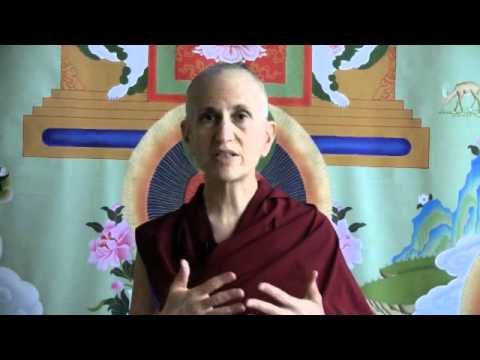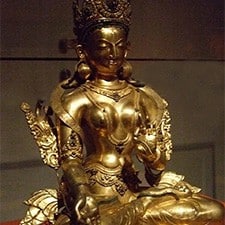The mantra and purifying karma
The mantra and purifying karma
This talk was given during the White Tara Winter Retreat at Sravasti Abbey.
- Focusing on the sound and vibration of the mantra
- Letting go of everything we’ve felt guilty about
- Owning our negativities instead of denying them
- The power of pretending, causing us to do something
White Tara Retreat 32: Mantra to steady the mind and purifying our karma (download)
We were at the place where it says, “While doing this visualization, recite 21 times: om tare tuttare ture mama ayur punye jnana pushtim kuru soha.” And, “Then recite as much as possible: om tare tutttare ture soha.” We had a long, drawn-out explanation about all of that. I should add that it is very nice sometimes to really focus on just the sound of the mantra, especially if your mind is quite jumpy and agitated and restless. Just really let it [your mind] sink into the vibration of the mantra and the sound of the mantra. I use that image of just sinking into that because it really works to steady the mind. And when you do a lot of mantra recitation, which, as I was saying the other day, is one of the points of doing these practices when we are initially doing tantra, we will find that the mantra creates a vibration in our body and in our mind. Not a big vibration where you are humming with the mantra, not like that, but it does affect your physical energy and your mental energy. I have found sometimes that I can really feel it if my mind is out of sorts, then you can feel how the energy of the mantra and the energy of the mind are not mixing together. Yes, some of you have had that experience. That is how you get your own proof (your own experience) that it creates a certain energy in your mind. You want to stay with that energy.
It is good during the break times, after you finish your session and you stand up, that you continue saying the mantra. Don’t just think, “Oh, I only say the mantra when I’m sitting down.” No, you should be saying it as you are walking around, as you are doing all sorts of other things as well.
Purified of negative karma
Then the next line says, “Think and feel.” So think and feel, not just think. “I am liberated from all negative karma, disturbing attitudes, negative emotions, disease, interferences and dangers of untimely death. I will use my life in a meaningful way to transform my mind; develop love, compassion, the six far-reaching practices: and act in ways that benefit others, myself, and our environment.” You can add any other strong aspirations you want to add at that point, too.
You want to think and feel, “I am liberated from all negative karma.” What that means is that all that stuff you have been hanging onto, feeling guilty about: (for example) when you stole the crayons from your brother when you were seven years old; from then on, everything you have been hanging onto, you let go of, you release. You think, “All that negative karma has been purified.” Now, of course, it all hasn’t been purified. But by repeatedly thinking that way, after doing the purification practice, that is what makes it purified. Whereas, if we do the purification practice, and afterwards we think, “I haven’t purified anything,” then the purification practice doesn’t work. So, you think, “I have purified it.” You feel what it feels like to release that, and that whole psychological change becomes part of the purification that is reducing the heaviness of these negative actions that we have done.
Like I always say, really owning our negativities instead of denying them, but owning them and then purifying them, and then really thinking and feeling, “Now I have purified them.” That actually makes a very profound change in us psychologically as well as spiritually and karmically. It’s very important to think that.
No more afflictions
Then you also think, “All my disturbing attitudes and negative emotions.” In other words, all the afflictions; the six root, the 20 auxiliary, the 84,000… that they are all gone. This means that you don’t sit here with your mind going, “Oh, I can’t stand that person,” and, “Why didn’t this person do this,” and, “Oh, I really hope I get this, and that, and the other thing.” You just let go of all those thoughts, and for a moment give yourself the mental space to think of what it would be like to never feel offended, to never feel angry, to never get jealous, to never lose your self-confidence. Give yourself a chance to feel that way.
In one way you can say it’s pretend, but pretend is very powerful. In our life we pretend a lot and our pretending is what creates the cause for us to do something. When we were little kids, what did we do? We dressed up in mommy’s and daddy’s clothes. We pretended to be (them.) When I grew up, we were supposed to be pretending to be policemen and firemen and doctors. I don’t know what you were pretending to be, now, maybe rap stars. But whatever it is you desire to be, we have to be able to have some image of ourselves as being like that in order to actually become like that. In order to go to college you have to have some image of yourself as a student who is going to college. In the same way, to become a Buddha, we have to have some image of what it would be like to be a Buddha. Not just with our body being a Buddha’s body, but especially mentally what it would be like to be a Buddha. So you spend some time thinking, “Well, what would that be like?” You might actually find that as you are pretending to have that feeling, you might actually, (and) genuinely begin to have that feeling.
I am not talking about the kind of pretending we do when we are angry and we pretend to be so sweet to the other person. I am not talking about being a hypocrite. I am talking about releasing the mind that says, “The only possible way I can feel in this situation is anger!” It’s about releasing that mind and giving ourselves the opportunity to think about experiencing some other emotion instead. I am not talking about repressing. I am talking about giving the mind some space to see alternatives. We will continue with that verse next time.
Venerable Thubten Chodron
Venerable Chodron emphasizes the practical application of Buddha’s teachings in our daily lives and is especially skilled at explaining them in ways easily understood and practiced by Westerners. She is well known for her warm, humorous, and lucid teachings. She was ordained as a Buddhist nun in 1977 by Kyabje Ling Rinpoche in Dharamsala, India, and in 1986 she received bhikshuni (full) ordination in Taiwan. Read her full bio.


